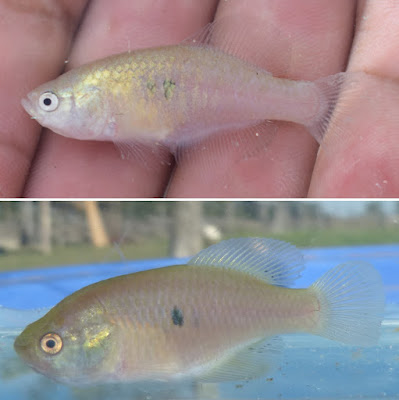 |
| Austrolebias ayoreode Drawert & Ergueta, 2024 |
Abstract
Austrolebias accorsii is redescribed based on specimens from type-locality, nearby temporary pools, and other locations within the same hydrologic unit. Additionally, a novel Austrolebias species is described, exclusively found in two temporary waterbodies in “Abayoy”, a unique vegetation type situated in the transitional zone between the Dry Chaco, Chiquitano Dry Forest, and Pantanal Flooded Savannas ecoregions in southeastern Bolivia, bordering Paraguay, where the last voluntarily isolated indigenous people outside the Amazon in America reside. Diagnostic characters for both species are presented. Within Austrolebias two species groups are recognized with different morphological characters, geographical distribution, and ecological traits of their habitats. Furthermore, we suggest the usage of median and interquartile range rather than mean and standard deviation to analyze morphometric and meristic data of rivulids, given the typically non-Gaussian distribution of this data.
Keywords: Chaco; Killifish; Seasonal fish; Taxonomy; Temporary water bodies
Austrolebias ayoreode, new species
Diagnosis. Austrolebias ayoreode males differs from all congeners, except A. accorsii, A. ephemerus,and A. vandenbergi, by presence of 1–3 transverse rows of scales on basal anterior and median portion of anal fin. Males of A. ayoreode can be distinguished from A. accorsii, A. ephemerus, A. melanoorus, A. queguay, and A. vandenbergi by presence of whitish to pale yellowish dots on flanks usually vertically aligned in unarranged rows (vs. absent in A. accorsii; mostly coalesced in vertical bars in A. ephemerus, A. melanoorus, and A. queguay; absent or, when rarely present, sparse and scattered in A. vandenbergi); from A. accorsii and A. vandenbergi by urogenital papilla mostly ...
Etymology. The name ayoreode is an eponym conferred in reference to the indigenous Ayoréode people, who historically occupied vast expanses of the northern Dry Chaco, and of whom a few groups still persist in the area of the type-locality of this species, standing as the last indigenous people in voluntary isolation outside of the Amazon in the Americas. Through this nomenclature, we intent to perpetuate the memory of the existence of the Ayoréode and emphasize the imperative of preserving their ancestral territory, which also is the habitat of the species described herein.
Heinz Arno Drawert and Carlos Ergueta. 2024. Redescription of Austrolebias accorsii (Cyprinodontiformes: Rivulidae) and Description of A New Species of the Genus from the upper Paraguay River basin. Neotrop. ichthyol. 22 (2); DOI: 10.1590/1982-0224-2024-0001



